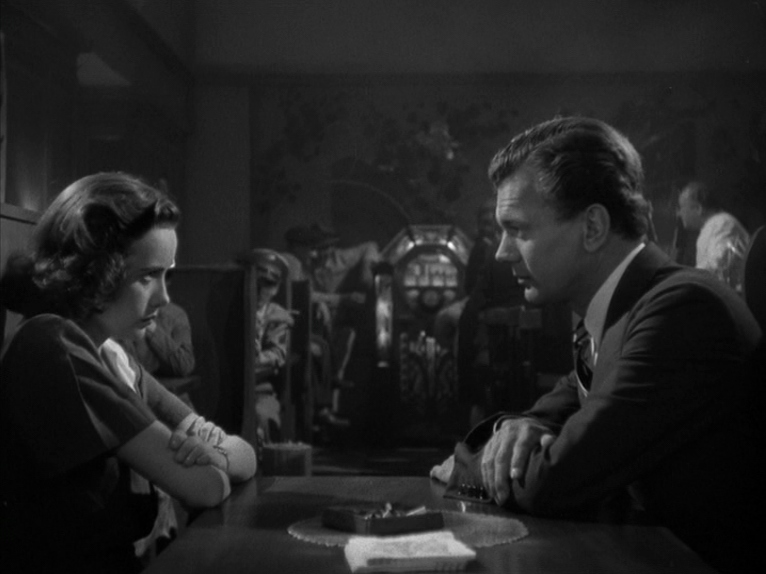
A teenage girl, overjoyed when her favorite uncle comes to visit the family in their quiet California town, slowly begins to suspect that he is in fact the "Merry Widow" killer sought by the authorities.
EN
“Alfred Hitchcock's Shadow of a Doubt (1943), from a screenplay by Thornton Wilder, Sally Benson, and Alma Reville, based on a Gordon McDonell story, with Teresa Wright, Joseph Cotten, Henry Travers, and Hume Cronyn, creates a unique vision for the early 40g of a small American town festering with feelings of fear, guilt, and paranoia. This dark vision of Hitchcock and his wife, Alma, interacting with the authors of Our Town and Meet Me in St. Louis, sig naled the true transplanting of the Master's touch to the United States. Hitchcock's inspiredly controlled camera work, in which he treats the visiting Uncle Charlie (Cotten) and the Santa Rosa niece Charlie (Wright) as doppelgängers of the same restless spirit, makes their relationship one of the most profound in cinema. Wright, representing regional innocence, gives her finest performance, and Cotten, as the suspected Merry Widow murderer and a figure of cosmopolitan evil, puffs evocative smoke rings around his role. Travers and Cronyn. as fans of grisly whodunits provide eccentric comic relief in an otherwise serious character study that is pitched more to subtle visual motifs than to Hitchcock's usual signature of pyrotechnic set pieces for the masses.”
Andrew Sarris1
“Like Blue Velvet's fever dream of transcendental perversity, Shadow of a Doubt is about awakening, the simultaneous darkening and enlarging of the world; the difference is that, where Kyle MacLachlan's Jeffrey Beaumont is able to tap into his own dark reserves, Wright's Charlie must muffle her knowledge as to not disturb the order of things. What was uncorked must be covered again, thus a killer is given a lavish hero's funeral while the heroine watches from afar, next to Macdonald Carey's ineffectual bearer of justice. Hitch's habit of taking us to the edge of the abyss and then returning us with a wink, so often resulting in unconvincing happy endings, here seals one of his most pitiless visions of a monstrous cosmos admitted only to be denied.”
Fernando F. Croce2
“Charlie Newton exhibits qualities shared by those famous hysterical patients of Freud. Freud described those women as follows:
I have described the patient's (Elisabeth von R.| character, the features which one meets with so frequently in hysterical people and which there is no excuse for regarding as a consequence of degeneracy: her giftedness ["She's got brains," Joe says of Charlie], her ambition, her moral sensibility, her excessive demand for love which, to begin with, found satisfaction in her family, and the independence of her nature which went beyond the feminine ideal and found expression in a considerable amount of obstinacy, pugnacity and reserve.
Freud's psychomoral prescription for women and his polite misogyny are apparent in this passage; Hitchcock's are no less apparent in his films, with the difference that Hitchcock's misogyny is hardly polite. Charlie also seeks to go "beyond the feminine ideal," the ideal embodied by that "town woman," her mother. She wants to escape the stultifying routines of family life in smalltown America. In fact, what she is really after is the independence and power of the "merry widow." Her uncle consecrates those wishes by placing on her finger the ring of the widowed woman he has murdered.' This unhealthy, unholy union - it is as if they are getting married - of her and her uncle, of her feminine and masculine halves, must be broken in order to allow the holier one of her and Graham. The masculine half of Charlie's personality seeks those "masculine" traits of independence and power; and it is this phallic, striving half that is really the cause of the aggression unleashed against her family and, ultimately, herself. The unconscious guilt she feels over the " destruction" of her family eventually deflects the course of her anger and redirects it toward herself.”
James McLaughlin3
- 1Andrew Sarris, "Shadow of a Doubt," Village Voice, 8 August 1987.
- 2Fernando F. Croce, "Review: Shadow of a Doubt," Slant, 17 February 2006.
- 3James McLaughlin, A Hitchcock Reader, edited by Marshall Deutelbaum and Leland Poague (Hoboken: Wiley-Blackwell, 2009), 150.

